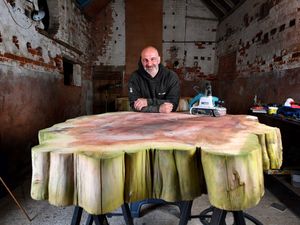Dudley filmmaker Marcus Distant on bringing footballer Duncan Edwards' life story to the screen
A Dudley filmmaker has brought the life of tragic Busby Babe Duncan Edwards to the big screen. . .
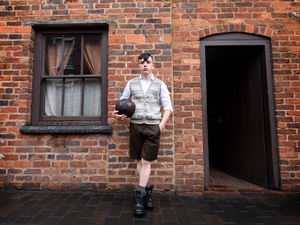
It was filmmaker Marcus Distant’s dream to pay homage to one of the Black Country’s most famous sons.
But he also wants the story of how Duncan Edwards rose from humble beginnings to become one of the greatest footballers ever to play for England to inspire the nation.
“Duncan means the world to people in Dudley and the Black Country.
“We’ve got this great icon who is loved by everyone and who can be an inspiration to us all by teaching us that anything in life is possible as long as you are willing to work hard towards your dreams,” says Marcus.
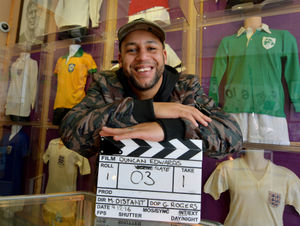
He has directed the short-film Duncan Edwards – The Boy Who Had It All telling the story of how Duncan famously lived on the town’s Priory Estate and signed for Manchester United as a teenager.
The footballer would go on to make 177 appearances for the Red Devils, scoring 21 goals and playing his part in two league title wins in the mid to late 1950s.
He also won 18 caps for England, netting five times for the national side and was once famously described by former team-mate and best friend Sir Bobby Charlton as ‘the only player who made me feel inferior’.
Duncan was notorious for being one of the hugely successful Busby Babes, the young United team formed under manager Matt Busby in the mid-1950s.
And tragically, he was one of eight players who died as a result of the Munich air disaster on February 6, 1958, along with flight crew, club staff, journalists and other passengers. Duncan was just 21 when he died in Germany, 15 days after the crash following an heroic fight for life.
There were 21 survivors including fellow Manchester United legend Sir Bobby Charlton, who had shared the same digs as Duncan in Manchester and during National Service when they were based at Nesscliff Barracks near Shrewsbury.
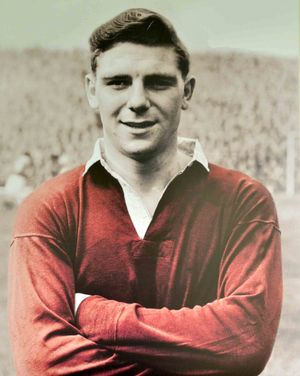
“Duncan didn’t get his fair share of life, it was cut short. But many people say he was one of the greatest footballers that ever lived,” says Dudley-born Marcus.
He has his own personal connection to the iconic footballer, as Duncan once babysat for his uncle John Ball and other members of the family.
The University of Wolverhampton graduate is now counting down the days until his short film honouring the Manchester United player is shown in their home town on February 24 – one of a number of tributes to the former footballer taking place this year.
But first the 30-year-old will travel to Northern Ireland for the first screening of The Boy Who Had It All since its world premiere at Old Trafford in October.
The film, which is being shown at the Ritz Multiplex in Cookstown tomorrow, has attracted interest around the world with a premiere in Norway also in the pipeline.
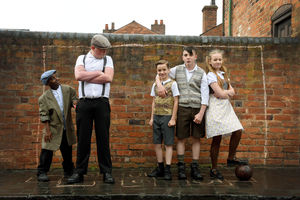
Marcus also has plans to enter it the Short Film Corner at Cannes in May as well as the Los Angeles Shorts International Film Festival in August and the prestigious Raindance Film Festival in London in September. Before getting started on the project, Marcus, whose day job sees him working at a metal recycling firm, had to gather together a dedicated cast and crew together as well as raise money to fund the production costs.
He turned to crowdfunding website Kickstarter to generate the £5,800 needed and appealed to people to back the project, saying: “His death at the heartbreaking age of 21 led to Duncan becoming somewhat of a mythical figure, but we would like to show a small slice of the reality of his life.”
Marcus also spent a year thoroughly researching Duncan’s life in great detail to ensure he would be giving his audience an accurate picture of his childhood and the start of his footballing career.
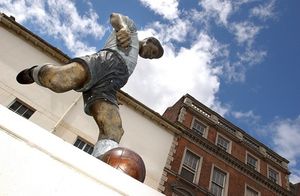
“I realised there were very few films about Duncan Edwards even though he was so talented. It was a story that needed to be told,” Marcus tells us.
Filming the 15-page script began at the end of 2016 with scenes shot at locations around Dudley including the town’s former museum in St James’s Road, Dudley Cemetery on Stourbridge Road and the Black Country Living Museum.
“The film starts off a bit like Titanic, in the ‘present’, and then goes back in time,” explains Marcus.
The world premiere took place at the home of Manchester United on October 1, which would have been Duncan’s 81st birthday.
Keen screenwriter Marcus says he is delighted to finally see his hard work to come to fruition and tells us that it will be a proud moment when the film is screened at the Dudley Archives and Local History centre later this month.
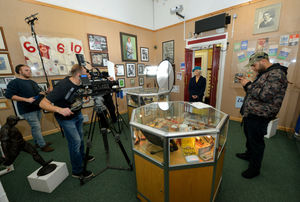
“It has taken two years from the initial concept to finishing the film. It was fantastic to have the world premiere at Old Trafford and I’m over the moon to be showing it in Dudley.
“I’m also amazed at the response the film has had from elsewhere, I’ve never expected it to be seen outside of the country let alone Norway,” says Marcus.
Running at 17 minutes, instead of focusing on the tragic end to Duncan’s life, it turns the spotlight on the footballer’s childhood growing up in Dudley.
Among the young cast members is Ben Avery from Oldbury who plays a childhood friend of Duncan’s named Thomas.
Ella George, from Burntwood, was cast in the role of Molly Leech – a fictionalised child version of Edwards’ real-life girlfriend. Ollie Greenham, from Solihull, plays Todd, the film’s bully. Among the adult cast members is Jayne Turpin, from Walsall, playing Duncan’s mother, Annie.
Playing the roles of a younger and an older Duncan are Cameron Hay, from Bedworth, and James Ayling, from Essex, respectively.
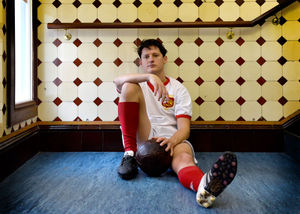
“All of the cast and crew have been amazing, we wouldn’t have a film without them, I can’t thank them enough,” said Marcus, who studied studied drama and theatre performance as university.
Film director Marcus says it’s important that Duncan’s story is continued to be told.
He believes that while older generations have grown up with stories about the player, younger people in Dudley are less familiar with the town’s hero.
“I find that people under-25 have seen the statue in Dudley High Street but they don’t really understand who Duncan was or what he achieved.
“I think it’s so important that as many people as possible know what an impact he made and I want to keep his legacy alive for future generations,” says Marcus.
People from Duncan’s home town are marking the 60th anniversary of his death in many ways this year.
Tomorrow Rose Cook-Monk and Andy Monk, who are board members of the newly-formed Duncan Edwards Foundation, will travel to Munich with around 1,000 Manchester United supporters.
They will be handing over a signed a book of remembrance as part of the poignant commemoration of the 60th anniversary of the air disaster in the German city.
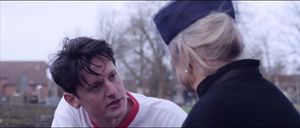
The book will be presented to the minister of the Church of St Peter near Manchesterplatz, a street near the airport named in honour of the club following the disaster. It will go on public display there.
The group will also visit two of the nurses who looked after Duncan at the time of the crash and see the opening of a memorial garden on the airfield, which is now disused.
Back in Dudley, running until March 30, is an exhibition, part of the Dudley Edwards Tribute programme, at Dudley Archives and Local History centre which is free to enter.
It features an extensive collection of photographs, press cuttings, memorabilia and football programmes telling his story from his Black Country roots to championship titles and England appearances. Many of the items will be donated to Dudley Archives when the exhibition ends.
The exhibition has proven to be so successful that on February 21, the venue will host an evening with former footballers looking back on Duncan’s life and football career.
Former Manchester United manager and Preston North End player Tommy Docherty will be joined by West Bromwich Albion winger Graham Williams, who spent 17 years at the club. Also in their company will be Alex Stepney, who was Manchester United’s goalkeeper when they became the first English club to win the European Cup.
The Mayor of Dudley, Councillor Dave Tyler, will also be attending the event,which starts at 6.30pm, along with members of Duncan’s family.
A special wall of remembrance is also being set up at St Francis Church in Dudley, where Duncan’s funeral was held, for visitors and a special service of remembrance will take place on February 18.
Also on the cards is a tribute dinner, featuring former players from Manchester United and the Black Country, will take place at the Copthorne House on October 11.
Jim Cadman, who has also organised the Duncan Edwards Tribute with a group of volunteer helpers, said the idea first came about from a promise he made to Duncan’s mother Sarah Ann back in 2001.
“Sarah and her family were VIP guests at a gala dinner and she said to me: ‘Can you make sure that folks in the Black Country never forget my Duncan?’
“The people of Dudley and the wider Black Country have a past to be proud of and Duncan’s achievements are an integral part of that, which is why we are determined to keep the promise we made to his mother 16 years ago,” explains Jim.
“The response from people has been fantastic. Duncan belongs to the Black Country and is a wonderful role model. In his short life he achieved so much and worked hard to make his dreams come true, these are qualities to be admired.”
The film premiere event at the Dudley Archives and Local History centre on Tipton Road, Dudley will take place from 2pm until 4pm on February 24. For tickets or to find out more search Duncan Edwards – The Boy Who Had It All on Facebook. People can also pay £5 on the day.
For more information about the February 21 event at Dudley Archives and the tribute dinner go online to duncanedwardstribute.com
From Black Country boy to Red Devil
Duncan Edwards was born on Thursday, October 1, 1936, at 23 Malvern Crescent, Holly Hall, Dudley, the first child of Gladstone and Sarah Anne Edwards.
The family later moved to 31 Elm Road on the Priory Estate in Dudley with Duncan attending Priory Primary School from 1941 to 1948 and Wolverhampton Street Secondary School from 1948 to 1952.
Even by the time Duncan was playing for his junior school his footballing skill was already being noticed. One school master watching the 11-year old noted that the youngster ‘told all the other 21 players what to do and where to go and that included the referee and linesmen’.
At 14, Duncan was regarded as such a talent that a Manchester United chief scout recommended that manager and future mentor Sir Matt Busby go to Dudley and watch the boy for himself.
After the club had watched him for two years, club coach Bert Whalley drove through the night to get to Duncan’s house for sunrise on his 16th birthday to make sure he signed the contract as soon as possible.
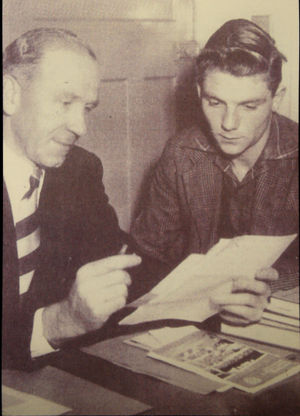
Duncan went on to make his debut for the first team on 4 April 1953 against Cardiff City.
Three and half years later he celebrated his 100th appearance for United and the ‘Busby Babes’ were beginning to create the sensational legend that took the footballing world by storm.
The big number 6, who was 5ft 10 and weighed just under 13 stone was nicknamed ‘the tank’. He played at wing half but could also play centre half, centre forward and inside forward.
He made a total of 151 league appearances, scoring 20 goals, for Manchester United and 18 international appearances for England, finding the back of the net on five occasions.
Duncan became one of the first footballers to earn money endorsing products. He promoted Dextrosol glucose tablets. This supplemented his wage of £15 per week during the season and £12 per week during the non-playing months.
But outside football he was known as a very private individual, almost shy and retiring, whose interests included fishing, playing cards and visiting the cinema.
The fortunes of the club were riding high and in February 1958 they played against Belgrade’s Red Star in Germany.
On Thursday, February 6, 1958, on the return flight to Manchester via Munich, the British European Airways Elizabethan aircraft landed to refuel shortly after 1pm.
Two attempts were made to take-off from the snow-covered runway and at that stage the players assumed that the flight would be cancelled until the following day.
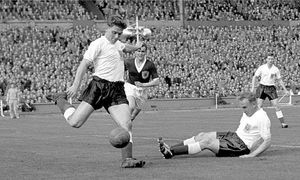
But to everyone’s surprise, the aircraft rolled off down the runway for the third time at 3.04pm that fateful afternoon.
The plane didn’t make it and Flight 609 crashed 54 seconds after take-off, killing 21 people onboard instantly. Two people died later from their injuries, Duncan, who has become engaged to his fiancée, Molly Leach, just days before the crash, being one of them.
At the time the Busby Babes had been six points behind League leaders Wolves with 14 games to go.
He is buried in Dudley Cemetery, where there is usually a fresh bunch of red and white flowers filling the black granite vase below the 6ft-high headstone on his grave.
Dudley Council has created a visitor trail to show where various landmarks are located to pay tribute to Duncan.
They include St. Francis Church, the parish church for the Priory Estate, where, on August 27, 1961, Sir Matt Busby unveiled a stained glass window dedicated to Duncan, which was designed by Francis Skeat.
At the ceremony, Sir Matt is quoted as saying: “There will only be one Duncan Edwards and any boy who strives to emulate Duncan or take him as his model, won’t go far wrong.”
In October 1999, a statue created by sculptor James Butler, commemorating Duncan Edward’s life was commissioned by Dudley Council and unveiled in Dudley market place by his mother and Sir Bobby Charlton.
Sir Bobby regards Duncan as ‘the greatest player I have ever played with and possibly the most skilful player I have ever seen’.
Other footballers have been full of praise for the Black Country legend. Terry Venables claimed that, had he lived, it would have been Duncan, not Bobby Moore,who lifted the World Cup trophy as England captain in 1966.
While Bobby Robson said: “Duncan tackled you with all his weight and if you were expecting a hard tackle he didn’t disappoint you.
“What was beyond dispute was that Duncan Edwards at the age of 21 was the finest young player in this country at that time and surely would have gone on to be one of the greatest players the world has ever seen.”
Tommy Docherty said: “There is no doubt in my mind that Duncan would have become the greatest player ever. Not just in British football, with United and England, but the best in the world. George Best was something special, as was Pelé and Maradona, but in my mind Duncan was much better in terms of all-round ability and skill.”
To find out more about the Duncan Edwards trail go online to discover.dudley.gov.uk/history-archives/duncan-edwards or call 01384 812770




